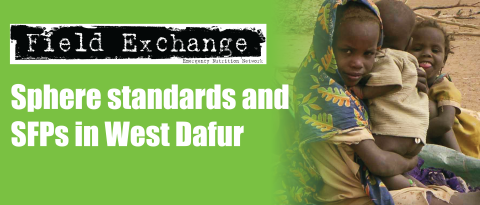Development of Rapid and Comprehensive Assessment Tools for Emergencies
At a recent meeting of the Inter Agency Standing Committee (IASC) Nutrition Cluster (see box) in Rome, work on assessment in emergencies was shared. An assessment sub-working group (SWG) of the Nutrition Cluster is mapping existing assessment, monitoring and surveillance tools for nutrition in order to recommend to the Cluster optimum tools for use. As part of this work, two tools are being developed - an Initial Rapid Assessment (IRA) tool, and a follow-on Comprehensive Nutrition and Food Security Assessment (CNFA) tool.
The IRA tool is in development, and has being shared for input with other clusters concerned with water, sanitation and hygiene (WASH) and health. This tool is designed to be a multi-sectoral assessment instrument used in the first seven days after the onset of an acute emergency. The tool could also be adjusted for a preliminary rapid assessment in a slowonset emergency. The IRA tool is now approaching two stages of testing - nonfield and field based (the latter ideally in the acute onset stage of an emergency). Both stages will rely on the involvement of non-governmental organisations (NGOs) and United Nations (UN) field offices, particularly in cluster countries (see box), willing to test and feedback on the IRA tool. Guidance on field-testing will be provided by the SWG lead.
Work on the CNFA tool is due to begin this month. This tool will be used at a later stage (2-6 weeks post acute emergency onset). The purpose of this tool will be to complement data collected with the IRA through a more comprehensive assessment of the situation and needs in the nutrition and food security sectors, and to assess the coverage, nature, quality, appropriateness, strengths and weaknesses of public health response measures instituted after the onset of complex emergency.
If you would like learn more about the tools and to get involved in their field testing, contact Mija Ververs, Food Security and Nutrition, Disaster Preparedness and Response Department, International Federation of Red Cross and Red Crescent Societies, P.O. Box 372, 17, Chemin des Crêts, CH - 1211 Geneva 19 Switzerland. Tel: +41 22 730 4449 IFRC, email: Mija.Ververs@ifrc.org or Oleg Bilukha, Medical Epidemiologist, International Emergency and Refugee Health Branch, NCEH/CDC. Tel: +1-404- 498-0904, email: obb0@cdc.gov
What is the IASC Nutrition Cluster?
The Inter Agency Standing Committee (IASC) Cluster leadership approach is one element of the Humanitarian Reform package, designed to enhance humanitarian response capacity, predictability, accountability and partnership. The UN Office for the Coordination of Humanitarian Affairs (OCHA) plays a key role in supporting the Humanitarian Coordinator - who has overall responsibility for coordinating the cluster approach at the country level - through coordination, information, advocacy and resource mobilisation, and policy development.
One of the key aims is to ensure sufficient global capacity is built up and maintained in nine key gap sectors/areas of response identified. Cluster responsibilities have been assigned by sector to lead organisations, which then work with relevant partners formed to develop preparedness and response capacity. Clusters and their lead agencies dealing with relief and assistance to beneficiaries are in a number of technical areas with cross cutting aspects including:
Technical areas:
Nutrition .......................... UNICEF
Water/Sanitation ............... UNICEF
Education.......................... UNICEF
Health .............................. WHO
Shelter (conflict, IDPs) ....... UNHCR
Shelter (natural disasters) .. IFRC 'Convenor'
Cross-cutting areas:
Camp Coordination &
Mgmt (conflict, IDPs) ......... UNHCR
Camp Coord & Mgmt
(natural disasters) ............. IOM
Protection (conflict,
IDPs and affected) ............. UNHCR
Protection
(natural disasters)
UNHCR/OHCHR/UNICEF
Early Recovery .................. UNDP
Common service areas:
Logistics .......................... WFP
Telecommunications .......... OCHA/UNICEF/WFP
Cluster members include UN agencies, NGOs, and academic/technical organisations whose operations relate to relevant field activities. The cluster approach operates at global, regional and country levels. The pilot countries where the cluster approach for nutrition is currently being implemented are Democratic Republic of the Congo, Liberia, Somalia and Uganda. In addition to a global and pilot country cluster approach, the cluster approach is applied in new major disasters, such as in Mozambique in response to the recent floods and cyclones.
For further information on the cluster approach and its activities, visit the website: http://www.humanitarianinfo.org/iasc/ and select 'cluster', or contact Bruce Cogill, Global Nutrition Cluster Coordinator, tel: +1 212 326 7400 email: bcogill@unicef.org
Imported from FEX website


